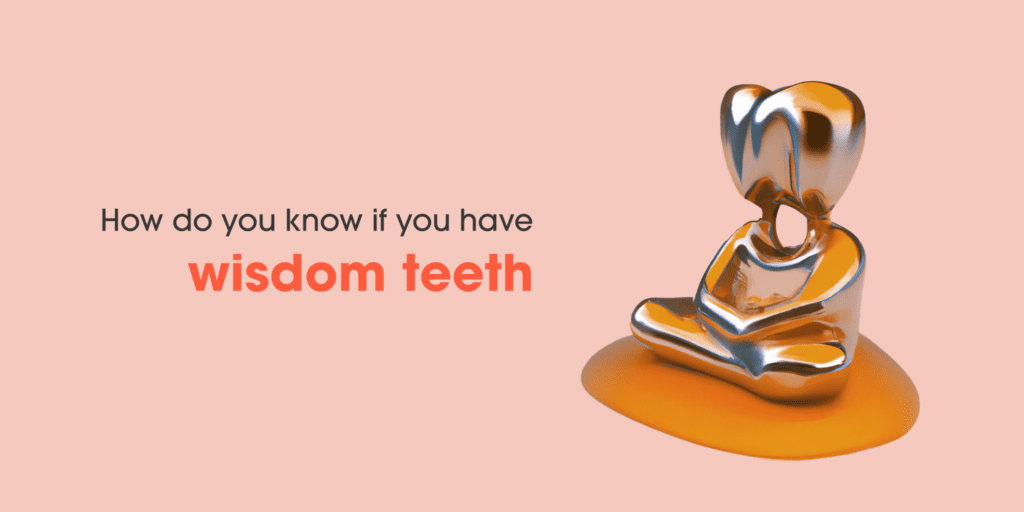Does every tooth have a job? If so, then wisdom teeth typically aren’t doing theirs very well. The third molar known as “wisdom teeth,” can give you a lot of problems if they come in crooked and are impacted, meaning they don’t have clear space to erupt through your gums into the mouth.
Wisdom teeth start forming in early childhood, but they’re usually fully developed by the time you reach 30 years old. Typically, third molars make an appearance sometime between 17-25 years old. But how do you know if you have wisdom teeth, especially if you’re not experiencing any painful symptoms?
How to Tell if You Have Wisdom Teeth
Unless they’re already erupting through your gums, the only way for our Los Angeles dentists at LA Dental Clinic to see if you have wisdom teeth is to take a full-mouth X-ray. This can be a panoramic or CBCT scan, depending on the situation. Both images show us a complete view of your oral anatomy and the surrounding structures, including any unerupted wisdom teeth.
Most people have four wisdom teeth, one in the back of each side of their upper and lower jaws. However, it’s not uncommon to have missing wisdom teeth or extra (supernumerary) ones behind them.
What are Wisdom Teeth Really For?
With access to great preventative care, most of us don’t need our wisdom teeth because we still have a complete set of healthy teeth. But wisdom teeth can be a replacement should the molars in front of them already be missing. After all, we use our molars to grind up our food so it can be absorbed during digestion.
Today, most people’s wisdom teeth are non-functional.
Can I Live All My Life With Wisdom Teeth?
Yes. Some people are lucky enough that their wisdom teeth erupt without any complications. Or others may have unerupted wisdom teeth that never develop painful cysts or infections.
However, wisdom teeth are highly likely to cause secondary problems because of where they’re located. Since they’re difficult to reach, wisdom teeth frequently develop cavities and periodontal disease and affect the health of adjacent teeth. This is why it’s typically best to remove them when complications arise.
Causes of Wisdom Teeth Pain
Wisdom tooth pain usually starts to make an appearance sometime during the teen or college years. It is typically due to situations involving:
Swelling
The third molar pain is usually due to inflammation and swelling in the back of the jaw. You can think of it similar to teething symptoms in an infant or toddler. Most swelling and pain go on for weeks or months until the wisdom teeth are removed.
Cysts
Natural eruption cysts form around teeth as they develop. But such cysts can expand into the bone, leading to complications.
Periodontitis or Cavities
The standard of care is to remove infected wisdom teeth rather than restore them simply because the chance of a recurring infection is relatively high. An active infection like gum disease or tooth decay can spread to your adjacent teeth.
Crowding
Wisdom teeth can cause movement in other teeth due to the pressure they create in the back of your jaw. This condition can be troubling if you’ve already had braces. Wisdom teeth can press into the adjacent teeth as the third molars may erupt at an angle or be impacted. This can physically crowd your other teeth together.
How Long Does Wisdom Teeth Pain Last?
Unfortunately, fully or partially impacted wisdom teeth can have long-lasting adverse side effects on your entire smile. Because of their location, oral hygiene is almost impossible, especially if the tooth is only partially erupted or there is crowding. None of these conditions are capable of resolving themselves. This is why people experience consistent wisdom tooth pain until their third molars are finally removed.
You may notice your wisdom tooth pain flaring up at random times. It typically comes and goes until, all of a sudden, there’s no relief at all.
You may be clear regarding discomfort if you’re almost 30 years old and have never experienced wisdom tooth pain. But it’s still important to monitor those teeth routinely to intercept any potential complications.
Do I Need Wisdom Teeth Removal?
Wisdom tooth removal is necessary if the healthy teeth next to them are at risk of damage or infection. At LA Dental Clinic in Los Angeles, we might also recommend extracting your wisdom teeth if you are:
- In pain
- Have a wisdom tooth that is only partially erupted
- There is an active cavity in your wisdom tooth
- Have periodontal disease in that area
- Presenting signs of an impacted wisdom tooth
- Experiencing TMJ pain
- Developing crowding or overlapped teeth
- If the wisdom tooth is pushing against the tooth in front of it causing a cavity or gum disease in the area.
Removing your wisdom teeth eliminates the higher risk of infection in your mouth, but most importantly, it prolongs the health of your functional smile.
Is Wisdom Teeth Removal Painful?
Wisdom tooth removal is a type of oral surgery and can vary from one person to the next. Some third molar extractions are simple and can be completed with a local anesthetic, while others are more complex and performed under sedation. Our Los Angeles dentists will discuss which comfort options are available to ensure you don’t have to feel a thing!
After your surgery, you’ll want to take a few days off to rest and recover. We recommend taking all medication as directed and avoiding rigorous exercise to prevent complications (such as a dry socket.) Staying hydrated and eating soft foods will help your mouth heal quickly.
Consultations for Wisdom Teeth in Los Angeles
Starting to notice your wisdom teeth come in? Check it out with the dentists from our Los Angeles practice: call LA Dental Clinic to reserve a no-obligation exam and consultation. You can reach us at (213) 342-6276, or schedule a virtual consultation through our online booking system.
